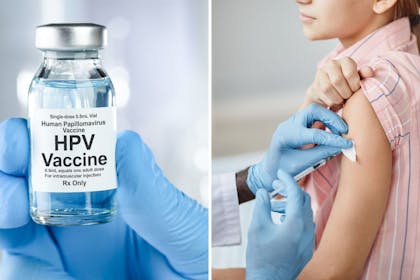Parents urged to get life-saving cancer jab for their teens

The number of school children having the vaccine has fallen, sparking fears they are at higher risk of the disease
Parents are being urged to ensure their teenagers get the life-saving HPV vaccination after figures showed the numbers of youngsters receiving it has dropped 'dramatically'.
The NHS jab is offered to all children aged 12 and 13 who are in years 8 and 9 at school.
It is given as an injection in the arm, and helps prevent a number of cancers including cervical cancer, cancers of the head and neck (mouth and throat), and those affecting the genitals and anus.
- Stacey Solomon's Loose Women future revealed
- Families urged to check bank accounts for this cash sum today
- Martin Lewis issues 60 day energy bill warning
- Thousands of families to get Christmas bonus
- DWP £160 supermarket vouchers for thousands
Disruption caused by the Covid pandemic has been blamed for the drop in the number of youngsters getting the vaccine.
New Government figures suggests the uptake of the vaccine fell 7% from 2021 to 2022 when compared to the previous academic year.
'They must be protected'
The chief executive of the Oral Health Foundation charity, Dr Nigel Cater, said he is concerned by the figures, and says that young people could be left at a higher risk of illness if they don't get the jab.
'The pandemic led to mass disruption for school vaccination programmes, so please check that your child is up to date and received their HPV dose,' he said. 'If you are not sure, or if you think they missed out, please contact their school.'
'It's a life-saving vaccination, and they must be protected.'
The NHS vaccination programme is free and provides protection from many different illnesses throughout our lives, including #measles, #HPV and #meningitis.
— UK Health Security Agency (@UKHSA) October 24, 2023
Read more: https://t.co/Z1HoPHGTqu#VaccinesWork #Vaccination pic.twitter.com/DZDrzF7xgV
What is HPV?
HPV stands for Human papillomavirus.
The NHS describe it as 'the name of a very common group of viruses'.
They go on to explain that they 'do not cause any problems in most people, but some types can cause genital warts or cancer'.
HPV types linked to cancer are called high-risk types. The cancers linked to high-risk HPV include:
- cervical cancer
- anal cancer
- penile cancer
- vulval cancer
- vaginal cancer
- some types of head and neck cancer
How does HPV spread?
HPV is spread through skin contact, usually when having sex.
The NHS say:
'Many types of HPV affect the mouth, throat or genital area. They're easy to catch. You do not need to have penetrative sex.'
They add that you can get HPV from:
- any skin-to-skin contact of the genital area
- vaginal, anal or oral sex
- sharing sex toys
And crucially, HPV has no symptoms, so you may not know if you have it.
What does the HPV vaccine do?
The NHS state that the HPV vaccine 'helps protect against human papillomavirus (HPV)' and say that it is 'recommended for children aged 12 to 13 years old and people at higher risk from HPV.'
Since the vaccine has been used, The NHS say that there has been 'a big drop in the number of young people getting conditions linked to HPV, such as cervical cancer and genital warts', and add that 'research suggests that over time the HPV vaccine will help save thousands of lives in the UK.'
Data from 2020 showed that HPV infection rates had fallen below 2% in 16 to 18-year-old girls, with a spokesperson from Public Health England commenting at the time that it was the '5th year of finding less than 2% of young sexually active women infected with HPV16 or 18, demonstrating the huge impact of the vaccination programme in its first 10 years.'
The vaccine was introduced in the UK in 2008, initially just for teenage girls, but was extended to boys in 2019.
Increase in mouth cancer cases
Another reason the Oral Health Foundation's Dr Nigel Cater is so concerned about the fall in numbers of teens having the vaccination is because there has been a rapid increase in mouth cancer in recent years, and this is often caused by HPV.
'HPV is a leading cause of mouth cancer, a disease which has seen the number of cases double over the last generation,' he said. 'The best form of protection against HPV is the vaccination, which, to be effective, should happen before a person becomes sexually active.'
Related stories
Child vaccination programme changes announced








